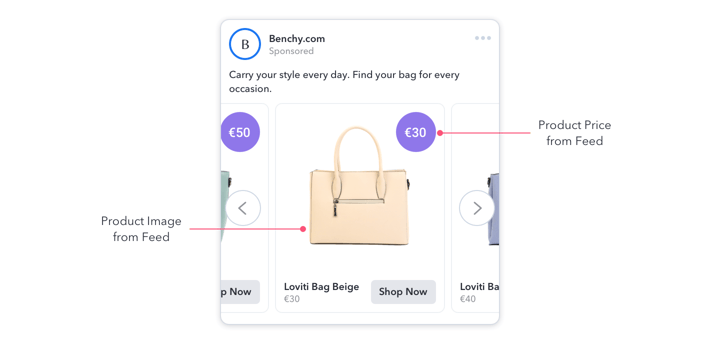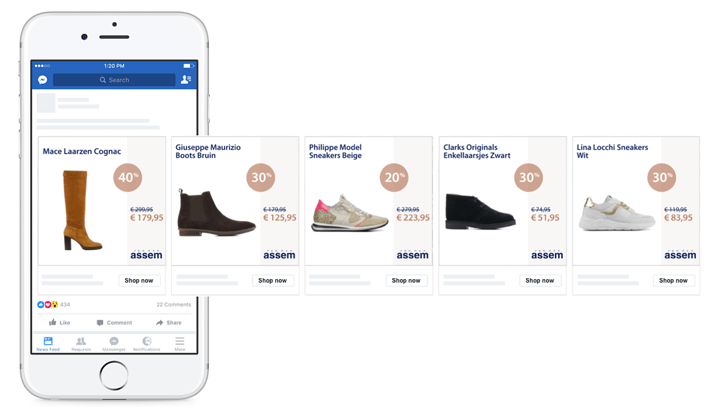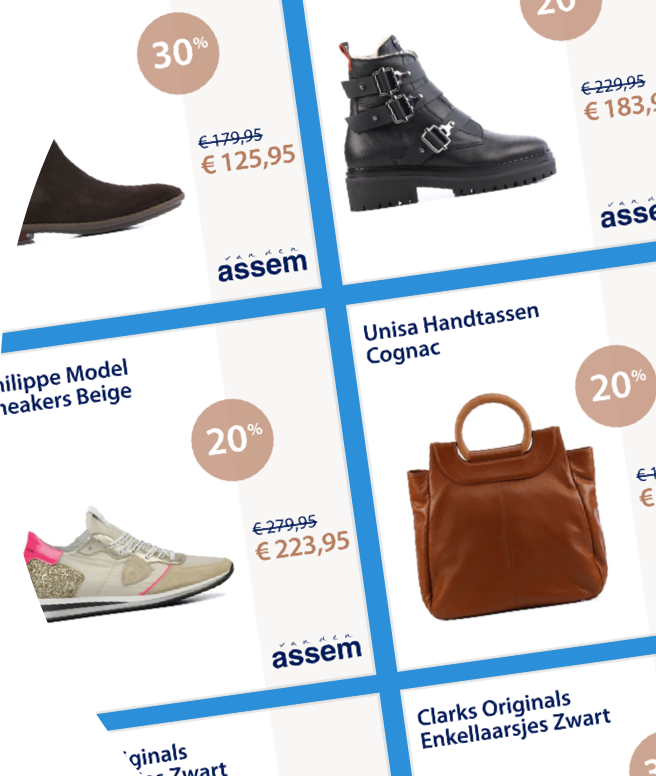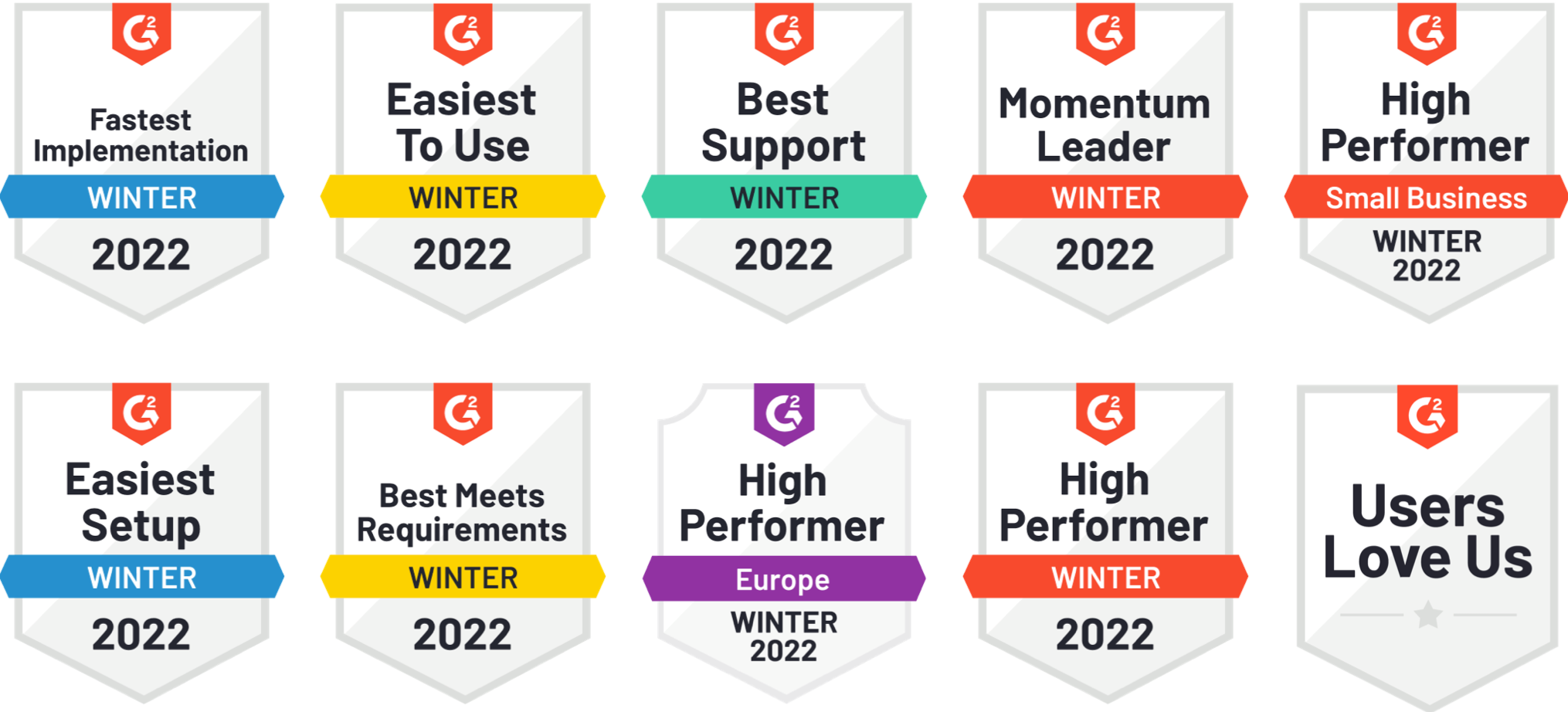Facebook has now become one of the most effective online advertising platforms. With its 1.4 billion daily users the platform gives companies a great opportunity to reach new and existing audiences. In 2021, it's predicted to generate 94,69 billion US dollars in ad revenue.
One of the main factors behind Facebook’s growth as one of the world's leading online advertising platforms is their Dynamic Ads (previously called Dynamic Product Ads or DPAs).
What are Facebook Dynamic Ads?
Launched in 2015 Facebook’s Dynamic Ads is an ad format that allows you to show the right ads to the right people. The ads are served automatically using a dynamic template that draws information from your product catalog (also called the product feed). This removes the burden of creating individual ads for each and every item you sell.

A dynamic ad, made using the Facebook solution. You can change the color, shape, and placement of the price tag, but not much more.
You can create dynamic ads within the Facebook Ads Manager platform. Facebook gives you the opportunity to create a simple template where you can have a product photo and price in your ad creative. This can be very convenient but the downside is: these templates don't give you much creative freedom, meaning you can't really test the performance of your ad creatives.
Carousel is the most common dynamic ads format on Facebook but it’s not the only one. You can also create dynamic ads as single image or collection ads. The collection format is mobile-only and includes a cover image or video with multiple products shown underneath.
If you want to have more control over your dynamic ad creatives, you can use third-party creative management platforms (CMPs) like Bannerwise. This allows you to create custom templates where you can be much more deliberate and creative. With CMPs, you can generate ads with different elements that match your product catalogs; you can add branding, social proof, urgency, and more to your dynamic ads.

With a CMP, some of the things you can add to your ad creatives are branding, sale percentage, and product name like Van den Assem did above.
The resulting ads can be used in combination with Facebook’s retargeting tools and audience insights, which makes them great to use in different stages of the customer journey.
The ads are placed on Facebook News Feed, Facebook Messenger, across the Facebook Audience Network, and Instagram. They’re adjusted for all devices so you won’t have to worry about creating different sizes.
Don’t confuse Dynamic Ads with Dynamic Creatives, another ad format Facebook offers. Dynamic Creatives is Facebook’s version of Google’s
Responsive Display Ads. You upload brand assets like copy and visuals, set up the targeting, and let Facebook do the rest. The ads generate in real-time without further input.
Thanks to Dynamic Ads, Facebook has become one of the key drivers for conversion, not only for retail but for several industries. In fact, the recent name change from Dynamic Product Ads to Dynamic Ads was made to reflect this diversity. Dynamic Ads were so effective that industries like travel also started using them. Dynamic Ads proved to be for more than just products. Now, there are even dedicated ads for different industries like travel, real estate, and automotive.
With Dynamic Ads, you have control over the template and the product information to be displayed but they don’t have to individually create ads for each product. In combination with the ability to use them with Facebook’s targeting solutions, Dynamic Ads gives companies the opportunity to target consumers with relevant, well-crafted ads.
Seeing the success of Facebook Dynamic Ads, other social media platforms like
Snapchat and
Pinterest have also launched their version of Dynamic Ads.
Benefits of using Facebook Dynamic Ads
Dynamic Ads are popular with marketers across various industries because they are:
With Dynamic Ads, you can automatically serve personalized ads to your audience. For example, for a retargeting campaign with Dynamic Ads, you can show your potential customers the exact products they added to their cart but left without purchase.
It is possible to create an ad for every product in a company's catalog with just one template. All a marketer has to do is create the template and connect it to their product feed.
Since the Facebook Dynamic Ads format gets the data it needs to create ads from the marketer's product feed, the ads always match the product feed. This means you won’t have to constantly update ads. With Dynamic Ads, your potential customers will never see an ad for a sold-out product or one with an out-of-date price tag.
The personalization of ads, the ability to scale them easily and keep them up-to-date without effort make Dynamic Ads highly effective. Brands who use Dynamic Ads well demonstrate impressive results, like Van den Assem who saw a 51% increase in their ROAS and 440% increase in their conversion rate.



